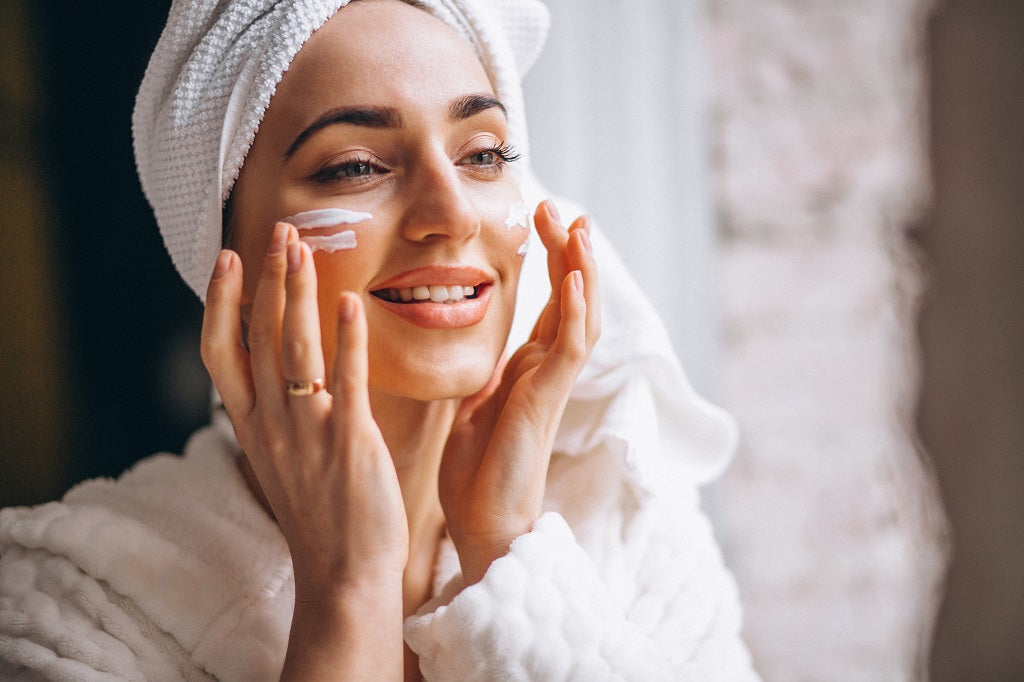Trust us when we say those Instagram filters are completely addictive! Clean, smooth, wrinkle-free, fresh skin texture under the Lo-Fi filter makes us fall in love with our pictures. We’re sure you must have wondered how to get such flawless skin in real life. Well, what if we say there is a magical potion sitting neglected in your vanity that can help you maintain and improve your skin?
You might think that the answer is obvious, but sunscreen can be the answer to all skin-related woes. An often overlooked skincare product that is infamous for its white cast and sweat-inducing quality, it can really help in improving the tone and texture of your skin.
The sun is our frenemy; It is the source of solar energy but the cause of solar damage as well. The UVA and UVB rays emitted from the sun can certainly cause excessive damage to the skin. Sunscreen is basically a soft veil of protection that not only protects but also prevents. It shields the skin from the damage caused by the sun and therefore prevents premature ageing of the skin. Using it every day can cause considerable improvement in the skin, and who knows, a simple sunscreen might just instill so much confidence in you that you might just want to shun all the filters, (except for the sun filters offered to you by sunscreen).
Why Must You Befriend The Good-Old Sunscreen?
It is a known fact that UV rays of the sun can damage your skin, resulting in tanning and the early onset of signs of ageing. Hence, sunscreen plays a prominent role in skincare by protecting your skin from the harmful UV rays of the sun. Experts recommend applying sunscreen during the daytime, irrespective of whether you are indoors or outdoors. Unfortunately, many of us are still not clear about the importance of sunscreens and are confused about how to introduce them into our skincare regime.
There is a lot of conflicting information about different types of sunscreens and their efficacy on varied skin types. Two of the most commonly found ones are physical/ mineral sunscreens and chemical sunscreens. You might have noticed different levels of SPF mentioned on the label of the tube/ jar of the product but chances are, you may not have the exact idea as to what it represents. Moreover, most of us are unable to understand the difference between sunscreen and sunblock owing to our limited knowledge about sun protection.
In a bid to spread awareness about SPF and its importance, our panel of skincare experts has jotted down the difference between chemical sunscreen and physical sunscreen. In this article, you will also get to know which one is better for your skin type.
What Is Chemical Sunscreen?
Chemical sunscreen, also known as organic sunscreen has chemical compounds which absorb the UV rays, convert them into heat, and release it through the skin. Common ingredients such as oxybenzone, octocrylene, avobenzone, octisalate, are found in chemical sunscreens.
Pros Of Chemical Sunscreen
- Chemical sunscreens are very light in texture spread easily on the skin making them ideal for daily use.
- A small amount of the product is enough to protect the skin.
- Unlike mineral sunscreens, they do not leave a white film on the skin.
- Chemical sunscreen is easier to use with other skincare products and can be easily included in your skincare routine.
Cons Of Chemical Sunscreen
- Certain chemical compounds present in chemical sunscreens can cause an allergic reaction in people with sensitive or acne-prone skin.
- One needs to apply it at least 20 minutes before sun exposure
- The active ingredients present in chemical sunscreen can clog the pores and cause acne.
- Chemical sunscreen converts UV rays into heat and is harmful to people who are suffering from acute skin conditions such as rosacea as it increases heat under the skin, thereby worsening the redness.
What Is Physical Sunscreen?
Physical sunscreens, popularly known as sun blocks have been a staple in the skincare market. Minerals such as zinc oxide and titanium dioxide are used in sun blocks to block the sun rays and deflect them effectively. Unlike its chemical counterpart, a physical sunscreen does not get absorbed into the skin, instead, it stays on top of the skin, creating a translucent barrier against the harmful sun rays.
Pros Of Physical Sunscreen
- Protects the skin from UVA and UVB rays of the sun.
- Considered to be safe for pregnant women and babies.
- Unlike chemical sunscreens, it provides with instant sun protection
- Skin is less likely to get irritated.
- It has a longer shelf life
Cons Of Physical Sunscreen
- One needs to apply it every four hours because it has a tendency to melt away with sweat
- Certain sunscreens can leave a white cast on the skin
- It needs to be worked into the skin, for the white cast to completely disappear
- It can lead to increased precipitation.
- A generous amount is required for improved efficacy
How Do Chemical And Physical Sunscreens Work?
As per our skincare expert, while both types of sunscreens offer solar protection; they greatly differ in their mechanism towards sun defense.
Chemical sunscreens work by allowing the UV rays to get absorbed into the skin. Following which chemicals such as oxybenzone, octocrylene, avobenzone, octisalate react with the UV rays converting them into heat, which then gets dispersed throughout the skin.
Zinc oxide and titanium dioxide, the main components of mineral sunscreens are small particles that sit on the surface of the skin, physically preventing UV rays from damaging the skin cells.
Chemical Sunscreen Vs Physical Sunscreen: Which One Is Better For Your Skin?
Now that you are well aware of the pros and cons of chemical and physical sunscreen, you may have a better idea about which one will be best suited for your skin. As per experts, choose sunscreen depending on your skin type. If you have extremely dry, sensitive, or acne-prone skin, then mineral sunscreen is apt for you.
Chemical sunscreen may pose potential skin sensitization, causing an allergic reaction and triggering breakouts on sensitive skin. Thus most of the dermatologist recommend using mineral sunscreen.
Having said that, chemical sunscreen is a better option for swimmers and those who sweat a lot. It is preferred by those who sweat a lot and want a better absorbing sunscreen.
Whatever be the type of your sunscreen make sure that you apply it regularly in the daytime.
What To Look For When Choosing A Sunscreen?
While choosing a sunscreen, look for terms such as broad-spectrum, non-comedogenic, fragrance-free, non-greasy, and oil-free, with an SPF of 30 or higher. Choose a sunscreen depending upon your skin type and religiously apply it, for glowing skin, that is devoid of sunspots and premature signs of ageing.
Also Read : Powders Sunscreens- Do They Actually Work?
Disclaimer: All the content on anveya.com/blogs is solely for information. It is not intended to be a substitute for professional medical advice, diagnosis or treatment. Always seek the advice of your physician or a qualified health care provider. The information, suggestion or remedies mentioned on this site are provided without warranty of any kind, whether express or implied.



